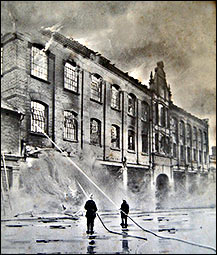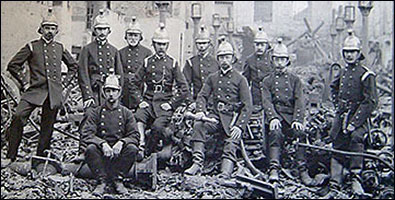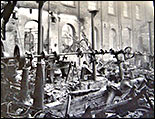|
||||||||
|
The Rushden and Higham Ferrers Water Board |
||||||||
|
||||||||
The Wellingborough Brigade had been summoned and took their engine into Alfred Street at the rear of the factory and obtained water from two tanks in the engine house. The Irthlingborough Brigade took up a position at the rear of the Succoth Chapel on the east side of High Street opposite the factory, and obtained water from a well in the yard. The town Surveyor, Mr Madin, and his assistant, Mr Pratt, and other officials in the surveyor’s department had taken immediate steps to shut off the water from other users in High Street in order to provide the greatest amount possible for the firemen. The Higham Ferrers Brigade arrived in the middle of the afternoon and was stationed in High Street near the Independent Wesleyan chapel. They found a well at the back of one of the shops but obtained very little water. Mr Pratt was informed that there was a well on the premises of the chapel and he went in search of the caretaker. By means of buckets this water, together with water from another well at Messrs Allen’s box factory, was carried to the tubs into which the suction pipes from the pumps were placed.
In the weeks immediately following Caves’ fire concerns were raised in the press regarding the water supply in Rushden and its inadequacy, but the inhabitants of the town generally appear to have been less anxious. Whilst the Urban Council continued to search for an abundant supply of water for Rushden, it was felt that firms which were contemplating establishing themselves in the town were being influenced to seek other locations. Notably, the Co-operative Wholesale Boot and Shoe Society feared that the Council might not be able to supply their factory with water and arranged an interview between one of their directors and Mr G Denton, the Chairman of the Council. Mr Denton reported back to the Council that the matters were not quite so bad as they were made out to be, seeing that the Council supplied about 10 gallons of water per head of the population daily. In October Mr Middleton met the Committee and reported that the results of the further pumping operations in the gravel at Sharnbrook indicated even more conclusively that it would be impossible to obtain a permanent and sufficient supply from that source. He advised that the only courses that remained open to them were either to obtain Parliamentary powers for taking water direct from the river Ouse, or to adopt one of the upland schemes detailed in his previous report. He was not in favour of going to the Ouse for their supply as the analysis of the water showed some rather unsatisfactory results, combined with the difficulties that they would face in obtaining the necessary Parliamentary powers, especially if there was any strong opposition. Regardless of whether they decided to pursue obtaining water from the Ouse or adopt an upland scheme he recommended that immediate action should be taken in order to get a Bill introduced in the next sessions of Parliament. Regarding an upland scheme, Mr Middleton was aware that the Higham Ferrers Water Company had already acquired an Act of Parliament which fixed the amount of compensation water for a proposed scheme at Sywell, and that the Council had met a representative with a view to obtaining a supply from that Company. He felt it was doubtful that unless Rushden became a customer the Company would be unable to establish the proposed water works at Sywell. Should that prove to be the case, he was of the opinion that the Council should try, in conjunction with the borough of Higham Ferrers, to acquire the Company’s water rights. The quantity of water from Sywell would not match that to be obtained from his scheme at Harrowden, but it possessed the very real advantage that they already had their Act of Parliament, whilst there was always the risk that Parliament could unduly increase the amount of compensation water determined for the Harrowden scheme. After a lengthy discussion, it was decided to approach the Higham Ferrers Water Company as to the possibility of amending their Act by taking out all the parishes concerned except Higham Ferrers, and transferring their powers to Rushden Council. If this arrangement proved unsatisfactory, the Committee would recommend that the Council should promote a Bill for taking water direct from the river Ouse. The response from the solicitors to the Company expressed their opinion that there would be no difficulty in effecting the suggested alterations, and a conference was arranged in London between themselves and representatives of the Council. The Corporation of Higham Ferrers had appointed a deputation to ascertain the intentions of the Water Company in regard to carrying out their scheme, and they reported that as the interests of the two towns in respect of the supply of water were so identical the two deputations should have a joint interview with the Company’s representatives. It was therefore, on Friday, 11th October 1901, that the Chairman of Rushden Urban Council (Mr G Denton), the Clerk (Mr G S Mason) and Mr Middleton, attended a conference with the promoters of the Higham Ferrers Company, together with the deputation from the Corporation of Higham Ferrers. The result of that meeting was that the Company expressed their willingness that the powers of their Act of 1900 should be taken over and carried out by the Corporation of Higham Ferrers and the Urban Council of Rushden on payment of £1,250 towards the costs and expenses of their Act. The Clerk advised that if the two Councils were to act jointly it would have to be by means of a “joint water board”, and the details could be arranged between the two towns. He added that one great advantage of a joint board would be that the loan for the undertaking could be more readily financed and probably at a lower rate of interest. The loans could also be extended over a greater number of years. The members of the Council evidently warmed to the opportunity of Rushden working so closely with Higham Ferrers in promoting the joint scheme. The Committee instructed the Clerk to invite the Corporation of Higham Ferrers to join with Rushden in the important undertaking of providing an adequate water supply for the two towns.
|
||||||||


